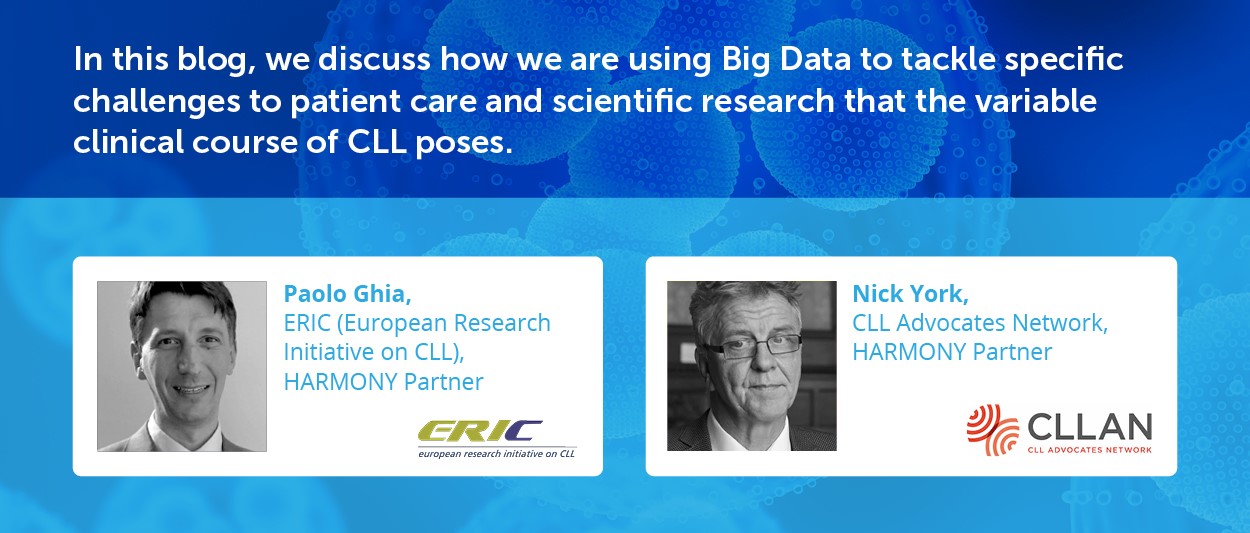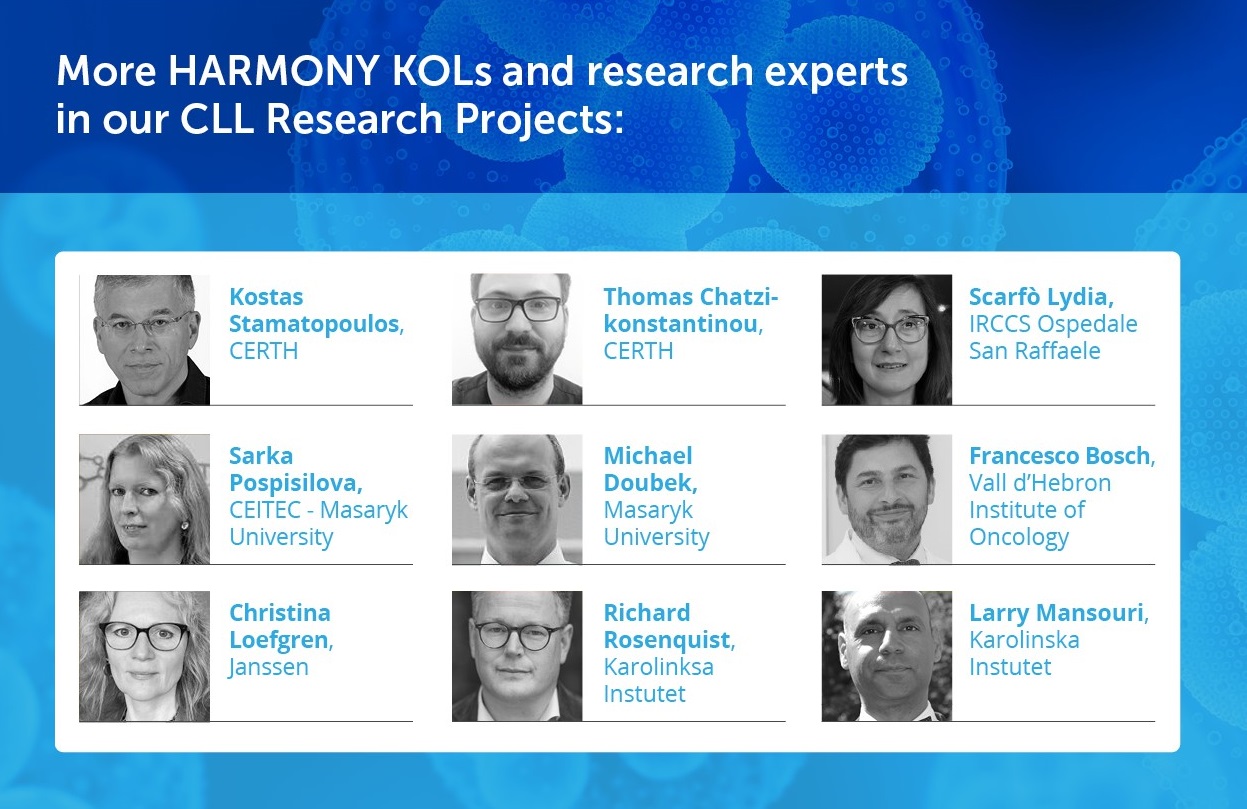
HARMONY Partner Professor Paolo Ghia is a clinician and affiliated with the European Research Initiative on CLL (ERIC). “From a clinical point of view, CLL is very heterogeneous. Some patients have an indolent disease and will never need treatment. Others have a slowly progressing disease and may need treatment several years or decades after diagnosis. There also is a group of patients who already feel sick at the time of diagnosis and need treatment within a few months. To discover the different features that characterize subgroups of CLL patients, we need a huge research network at the European level. This is what HARMONY has established.”
The HARMONY Alliance unites more than 100 organizations. They are jointly using Big Data to improve the care for people with blood cancers. HARMONY has created a unique Big Data Platform with over 80.000 anonymized European patient records. This allows research teams such as Ghia’s to study subgroups of patients. For instance, the HARMONY CLL Research Teams have recently studied the clinical relevance of ten of the most frequently mutated genes in CLL.
Genetic aberrations
Ghia: “CLL is highly heterogeneous from a genomic perspective as well. More than two hundred genes have been found to be involved in the disease. Aberrations in these genes are usually found in less than five percent of patients. This means that every physician will probably only see a handful of patients with a particular genetic aberration. By collecting data from thousands of patients, we can create substantial groups of patients with the same genetic aberration, and study the clinical outcome, response to therapy, and life expectancy of these patients.”
This knowledge may allow clinicians to tailor the treatment to the patient’s unique characteristics and to give a more reliable estimate of what patients can expect. Ghia: “As a clinician, I would like to be able to inform my patients about what they can expect from this disease. Will they need therapy soon, many years from now, or never? Will they respond to the therapy or not, and for how long? These are valid questions and it would be nice if we could give a clearer answer.”
Patient’s voice
It is not only clinicians and researchers that are using Big Data to improve the lives of people with CLL. Patient organizations are also collecting impressive amounts of data, for instance by means of surveys about patients’ experiences. Nick York of the CLL Advocates Network (CCLAN): “CCLAN represents a global network of organizations that support people with CLL. Across the network, different national organizations are running patient experience surveys to obtain insight in treatment experiences, treatment preferences, education needs, quality of life at different points, the impact of the disease on people’s daily living, and specific needs during the COVID pandemic. We are becoming very data-driven because it is important that our actions are evidenced through data. If we are going to be representing our patients, we need to make sure that the voice that we are representing is the correct voice” .
Patient Cluster
CCLAN is one of the nine organizations in the HARMONY Patient Cluster. These organizations and their patient communities are involved in designing Research Projects and interacting with patients and their families. In addition, they are involved in defining Core Outcomes Sets. York: “One of the aims of HARMONY is to increase consistency in future clinical trials, allowing for the results to be compared and combined. To do this, clinical trials need to use consistent core outcomes. HARMONY is running so-called Delphi Surveys to compile Core Outcomes Sets for CLL and other blood cancers, using the opinions of patients, clinicians, regulators, and industry. CCLAN is trying to ensure that the Core Outcomes Set for CLL includes measures that matter to our patients: patient-reported outcomes or quality of life measures that relate a little bit more to the patient experience, rather than only clinical measures such as overall survival.” To summarize, we are becoming increasingly data-driven and we have a lot of valuable data to offer. It is hopeful that various stakeholders are now collaborating within HARMONY, taking the first small steps to ensure that the patient’s voice is incorporated in the Research Projects and other activities.
Other tumors
Meanwhile, HARMONY research teams are gearing up to launch new Research Projects that will harness the power of the Big Data Platform. Ghia: “In another research project, we are using the HARMONY Big Data Platform to understand why patients with CLL are at an increased risk to develop other tumors. We have studied data from more than 13,000 patients with CLL. We discovered that patients who have been treated with immuno chemotherapy have a higher risk of developing acute leukemia or myelodysplastic syndrome. This is probably because the immuno chemotherapy damages the DNA in the cells of the body, making the patient vulnerable to developing other malignancies. This could be another reason to avoid exposing patients to this therapy, in particular young patients. Indeed, the treatment landscape in CLL is dramatically changing at present, shifting from immuno chemotherapy to chemo-free treatments.”
Bright future
Ghia concludes with an encouraging message: “CLL can be life threatening, but many patients can continue to live their lives under medical control. They can have a very long life expectation, if not identical to individuals without the disease. This is due to the nature of the disease, but also thanks to the new chemo-free treatments. We are moving away from immuno chemotherapy and the complications that it can cause. Therefore, I think that patients should know that the future is bright. Scientific research, such as the Research Projects that are carried out within HARMONY, is really moving the field forward. Every year, we can see new achievements, new progress and new therapies that are prolonging the life and the quality of life of our patients.”
Relevant links

HARMONY (since 2017) and HARMONY PLUS (since 2020) are funded through the Innovative Medicines Initiative, Europe's largest public-private initiative aiming to speed up the development of better and safer medicines for patients. Funding is received from the IMI 2 Joint Undertaking and is listed under grant agreement for HARMONY No. 116026 and grant agreement for HARMONY PLUS No. 945406. This Joint Undertaking receives support from the European Union’s Horizon 2020 Research and Innovation Programme and the European Federation of Pharmaceutical Industries and Associations (EFPIA).
Join the HARMONY Alliance: watch the video below and/or contact us now >
Receive the latest news. Click here to subscribe!